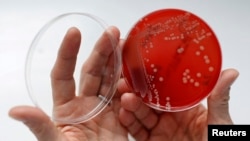Antibiotics that have become ineffective against a lethal bacterial infection may get new life, thanks to the discovery of compounds that weaken the pathogen.
Staphylococcus aureus has become a leading cause of death worldwide. The drugs penicillin and methicillin, developed in the last century, are cheap and available but have become ineffective against the bacterial menace.
Newer, more effective antibiotics like vancomycin have been developed, but they are more expensive and have to be given intravenously. So the race is on to develop even more potent antibiotics that are easier to use.
But penicillin and methicillin may not be out of the picture.
Researchers at pharmaceutical company Merck discovered two compounds that weaken the biological structure of drug-resistant Staph aureus, also known as MRSA, clearing the way for the older antibiotics to kill the pathogen. They describe their work in the journal Science Translational Medicine.
Merck's Terry Roemer said that on their own, the compounds are not effective in killing MRSA. But taken with penicillin, they cleared the drug-resistant infection in mice.
“What is different and exciting about this is it is magic dust," Roemer said. "It’s not an antibiotic, but it helps. It’s an adjuvant. It assists.”
When the bacterial-weakening compounds become available, possibly in a few years, Roemer said they would be given along with traditional antibiotics to treat drug-resistant bacteria.
More important, Roemer said, the discovery opens up an entirely new avenue of thinking about fighting antibiotic-resistant infections like MRSA. Researchers could employ "more types of chemistry that have never been considered before because those compounds are nonbioactive. I mean, this is something that we need.”
Roemer thinks finding ways to boost the effectiveness of existing antibiotics could put scientists ahead in the race to develop new, improved drugs to treat drug-resistant bacterial infections.




